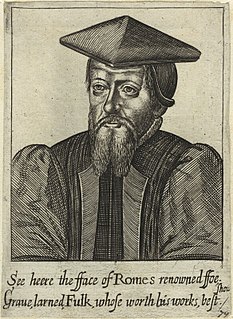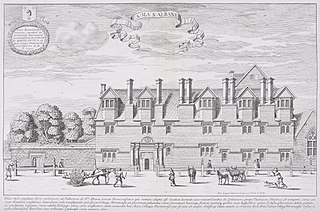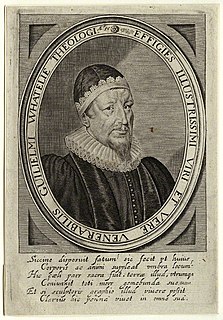Related Research Articles

John Whitgift was the Archbishop of Canterbury from 1583 to his death. Noted for his hospitality, he was somewhat ostentatious in his habits, sometimes visiting Canterbury and other towns attended by a retinue of 800 horses. Whitgift's theological views were often controversial.
Thomas Campion was an English composer, poet, and physician. He wrote over a hundred lute songs, masques for dancing, and an authoritative technical treatise on music.

Robert Persons, later known as Robert Parsons, was an English Jesuit priest. He was a major figure in establishing the 16th-century "English Mission" of the Society of Jesus.
Christopher Love was a Welsh Presbyterian preacher and activist during the English Civil War. In 1651, he was executed by the English government for plotting with the exiled Stuart court. The Puritan faction in England considered Love to be a martyr and hero.

William Fulke was an English Puritan divine.

St Alban Hall, sometimes known as St Alban's Hall or Stubbins, was one of the medieval halls of the University of Oxford, and one of the longest-surviving. It was established in the 13th century, acquired by neighbouring Merton College in the 16th century but operated separately until the institutions merged in the late 19th century. The site in Merton Street, Oxford, is now occupied by Merton's Edwardian St Alban's Quad.
The Treaty of Uxbridge of early 1645 was a significant but abortive negotiation to try to end the First English Civil War.

Samuel Bolton was an English clergyman and scholar, a member of the Westminster Assembly and Master of Christ's College, Cambridge.
Anthony Wotton was an English clergyman and controversialist, of Puritan views. He was the first Gresham Professor of Divinity. Christopher Hill describes him as a Modernist and Ramist.
George Walker (c.1581–1651) was an English clergyman, known for his strong Puritan views. He was imprisoned in 1638 by William Laud, Archbishop of Canterbury, an affair that was later raised against Laud at his trial. He became a member of the Westminster Assembly in 1643.
Edward Dering was an English priest and academic, known as a classical scholar, controversialist, supporter of Thomas Cartwright, and fiery preacher against his fellow clergy. Constantly in trouble from 1570, he was not found to be nonconformist in doctrine, but was an opponent of the episcopate.
Roger Goad (1538–1610) was an English academic theologian, Provost of King's College, Cambridge, and three times Vice-Chancellor of the University of Cambridge.
Richard Greenham (1535?–1594?) was an English clergyman of Puritan views, well known for his strong Puritan doctrine of the Sabbath. His many sermons and theological treatises had a significant influence on the Puritan movement in England.
John Walker D.D. was an English churchman, archdeacon of Essex from 1571.
The Westminster Conference of 1559 was a religious disputation held early in the reign of Elizabeth I of England. Although the proceedings themselves were perfunctory, the outcome shaped the Elizabethan religious settlement.
Henry Felton D.D. (1679–1740) was an English clergyman and academic.

Peter Turner M.D. (1542–1614) was an English physician, known as a follower of Paracelsus. He also was a Member of Parliament, during the 1580s.

William Whately (1583–1639) was an English Puritan cleric and author.
John Copcot, DD was an English cleric and academic, becoming Vice-Chancellor of the University of Cambridge and Master of Corpus Christi College, Cambridge.
References
- Smith, Charlotte Fell (1899). . In Lee, Sidney (ed.). Dictionary of National Biography . 59. London: Smith, Elder & Co. p. 72.
- Attribution
-
 This article incorporates text from a publication now in the public domain : Bullen, Arthur Henry (1887). "Charke, William". In Stephen, Leslie (ed.). Dictionary of National Biography . 10. London: Smith, Elder & Co. p. 67.
This article incorporates text from a publication now in the public domain : Bullen, Arthur Henry (1887). "Charke, William". In Stephen, Leslie (ed.). Dictionary of National Biography . 10. London: Smith, Elder & Co. p. 67.